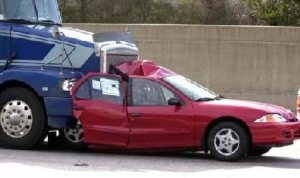To reduce the number of deaths and personal injuries related to truck accidents a group of road safety advocates petitioned the NHTSA to create a safety regulation that requires the use of truck crash avoidance technology
 New technologies that can help prevent truck accidents such as forward collision avoidance and mitigation braking (F-CAM) systems should be mandatory on all new big trucks and buses according to The Truck Safety Coalition, the Center for Auto Safety, Advocates for Highway and Auto Safety and Road Safe America. These four lobbyists have sent a joint petition to the National Highway Traffic Safety Administration to ask the agency to start working on a regulation that would require manufacturers of big trucks and buses to equip all their new vehicles with forward collision avoidance and mitigation braking systems (F-CAM). When a truck or a bus is equipped with a Forward Collision Warning System, the driver is warned by a signal that he is getting too close to a “target” in front of him and if he doesn’t react, the Collision Mitigation Braking (CMB) will automatically apply the brakes to reduce the impact speed or prevent the collision. The F-Cam system integrates both these technologies. This system has been studied by the NHTSA for a decade now. More recently the NHTSA also published a complete evaluation of the installation of F-Cam system on medium to heavy commercial vehicles that shows the benefits of such a system.
New technologies that can help prevent truck accidents such as forward collision avoidance and mitigation braking (F-CAM) systems should be mandatory on all new big trucks and buses according to The Truck Safety Coalition, the Center for Auto Safety, Advocates for Highway and Auto Safety and Road Safe America. These four lobbyists have sent a joint petition to the National Highway Traffic Safety Administration to ask the agency to start working on a regulation that would require manufacturers of big trucks and buses to equip all their new vehicles with forward collision avoidance and mitigation braking systems (F-CAM). When a truck or a bus is equipped with a Forward Collision Warning System, the driver is warned by a signal that he is getting too close to a “target” in front of him and if he doesn’t react, the Collision Mitigation Braking (CMB) will automatically apply the brakes to reduce the impact speed or prevent the collision. The F-Cam system integrates both these technologies. This system has been studied by the NHTSA for a decade now. More recently the NHTSA also published a complete evaluation of the installation of F-Cam system on medium to heavy commercial vehicles that shows the benefits of such a system.
According the the most recent statistics, more than 100,000 people suffer personal injury in truck accidents and close to 4000 of them are dying every year. A large portion of these crashes are rear-end crashes in which the large truck is the striking vehicle that crashed into another vehicle on the roadway. While every new manufacturer is proposing the F-Cam system on their new new trucks, only 3 % of the trucks on the road are equipped with it. Making this equipment mandatory seems to be the only way to achieve widespread implementation. Download a PDF of the Petition for Rulemaking
 New York Personal Injury Attorneys Blog
New York Personal Injury Attorneys Blog


